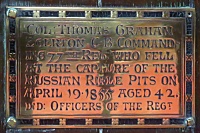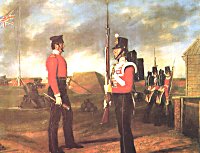The plaque is on the back of one of the choristers stalls in the chancel.
North side, front row, ninth from the west end.

Portrait

Major Thomas Graham Egerton, 77th Foot
inspecting a sentry on Kings Bastion,
Portsmouth 1849.
From an oil painting by D. Cunliffe
EGERTON C.B. COMMANDING
77TH REGT WHO FELL
AT THE CAPTURE OF THE
RUSSIAN RIFLE PITS ON
APRIL 19 1855 AGED 42.
DD: OFFICERS OF REGT.
Further Information
Colonel Egerton served with the 77th Regiment, was present at the affair of the Bulganak, at the battles of Alma and Inkerman, and the seige of Sebastopol. His gallant conduct was at all times the admiration of the Army. He fell in the brilliant capture of the Rifle Pits on the 19th April, 1855, deeply lamented by a regiment to which he had been such a noble example. [From the 1873 Guide to the Church]
Before he fell at the Rifle Pits, Colonel Egerton had shown himself to be an able officer, quite capable of making up his own mind when it was called for. During the battle of the Alma General Buller at one point ordered Egerton to take the 77th up to support a brigade in difficulty, but Egerton, knowing that Buller was short sighted and also that his own position was confronted by Russian battalions, backed up by cavalry, refused to obey. Buller reaction was to assume Egerton knew more than he did and ordered his own troops to form a square to repel cavalry, although none was visible by him or anyone else.
At Balaclava, on the 26th September 1854 the Governor of the Castle surrendered his castle and sword to Colonel Egerton of the 77th Regiment.
At the battle of Inkermann Egerton and his men of the 77th once more found themselves threatened when a large force of Russians were perceived coming out of the dense fog. "We found ourselves in the presence of an enormous column of the enemy's infantry..... their numbers were so great that they were soon swarming around our flanks, and crowding in our rear. The front of the column was not five yards from us when Colonel Egerton gave the word "Give them one volley on the knee and load." The men dropped on the knee, and poured a close volley into them with great precision. The Minie bullets tore through their heavy column from front to rear, and shook them to their centre. Our men rose up and loaded their rifles with as much steadiness as if they were on parade. Colonel Egerton then gave the words, "Prepare to charge" - "Charge!" The regiment rushed forward with a loud cheer, and threw themselves like tigers upon the enemy. The Russians met the attack bravely, crossing their bayonets with ours with the most determined resolution. A desperate contest ensued, but soon terminated in our favour, for the enemy could not stand the fury of our men. The mass began to waver and reel: their muskets went up in the air, and they fairly turned and fled...."
On the night of April 19th, 1855 a detachment of the 77th Regiment, under Colonel Egerton, captured two of the Rifle pits before Sevastopol, with little loss. Towards morning the enemy made a determined attempt to recover the pits. The men of the 77th charged and drove them back. Twice did the Russians return to the attack, but with no better success. "It was at this time that Captain Lempriere, a very young officer who had fought manfully at Inkerman, was mortally wounded, being shot through the lungs as he stood by the side of Colonel Egerton. Egerton was very fond of the lad, whom he was wont to call his child, and lifting him in his arms, carried him to a place of shelter in the trenches, immediately after returning to his post. Immediately after Sergeant McDonald, a gallant sapper who won the Victoria Cross by his conduct on the occasion, fell badly wounded by a grape shot in the right side. Colonel Egerton, ever as mindful of others as he was careless about himself, strove to keep up the sergeant's strength by giving him brandy out of his flask. His deed of mercy had scarcely been done than the enemy made a vigorous effort to recapture the lodgment, and in assisting to repulse them Egerton was shot through the head. Lord Raglan described the capture of the pits as a "brilliant achievement," though "dearly bought by the sacrifice of Colonel Egerton, who was one of the best officers in the army, and looked up to by all."
Both Egerton and Lempriere were buried in the graveyard of the 2nd Brigade on the side of the Woronzoff Road.
[Information quoted from the Regimental records and from the Navy and Army Illustrated, August 18th 1897, by Colonel W W Knollys]
According to Colborne and Brine in "The Last of the Brave", the inscription on the headstone to Egerton's grave read "In Memory of, Colonel Graham Egerton, 77th Regiment, who was killed, whilst commanding an attack, on the Rifle Pits, 20th April 1855". Lempriere's grave is the next in line.
See also:-
Memorial to men of the 77th Regiment who fell in the Crimea
Memorial to men of the 77th Regiment who died between 1856 and 1872
Memorial to the Old Etonians who fell in the Crimea (includes Captain Lempriere)
